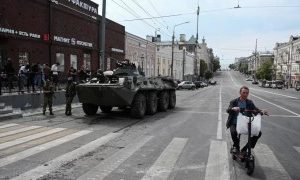
A week on from the dramatic mutiny by Wagner forces, residents in Rostov-on-Don – the city the mercenary troops seized – have been reflecting on the events that rocked Russia.
In just 24 hours, leader of the Wagner group, Yevgeny Prigozhin, staged an insurrection, sending troops into the city of a million people and further on towards Moscow.
Due to the current laws against criticising the so-called “special military operation” in Russia, the BBC has chosen to protect the identities of the citizens who spoke to us.
One Rostov-on-Don local – who the BBC is calling Vadim – described the moment he spotted Wagner forces in the city.
“I had to leave my home that day just to pop out and get something from the shop. About ten or eleven, I saw these armed people that had closed off the road. They were checking cars, asking people for documents but passers-by were simply allowed to carry on walking,” he told the BBC World Service’s Weekend programme.
When Vadim got home, he started receiving calls from worried friends asking him if he was okay. He decided to stay at home for the rest of the day.
“If I am to speak of the feelings I experienced that day, I suppose you could say I was alarmed and perhaps even scared. We knew that Prigozhin had planned to do something and Wagner is known for its crimes in various countries.
“The association that we have of Wagner killing someone with a sledgehammer caused me to be afraid,” he added.
Vadim says the war in Ukraine has changed the city completely. Its become more militarised and has a number of military hospitals and wounded people.
“The city is really quite close to the front and that’s how it feels.”
As Vadim sat at home in Rostov-on-Don, Anastasia was visiting Moscow from St Petersburg.
“We were checking the news together through the night and we woke up in the morning and there was even more news,” she said. “That was intense”.
Anastasia, also a pseudonym, was staying with a friend in the southwest of the city, where preparations for the arrival of Wagner forces had started. She wasn’t frightened that the troops would overtake the capital, she said. What made her anxious was the sheer uncertainty of the situation.
“All these things that seemed unreal previously, were beginning to happen. And it was completely unclear what was coming next. It was kind of scary, that uncertainty,” she recalled.
“When Prigozhin started his march to Moscow, we didn’t have any optimistic scenarios or what will happen. No one around me was happy about Prigozhin taking Moscow,” Anastasia said.
“All scenarios seemed pretty bad. And the only thing that kind of felt hopeful was that something seemed to be changing. Some factors were making it possible to change. And then it ended.”
By the end of Saturday, Prigozhin called the advance off and ordered his men back to base. His troops had come within 124 miles (200km) of reaching Moscow.
They retreated and by Monday, Wagner troops started leaving the city of Rostov-on-Don.
Vadim said life in the city has returned to normal but everyone has been joking about the events of the past week.
“We’ve been saying that on Saturday there was a mutiny, Sunday there was a day off, Monday there was a fire in the zoo, Tuesday there was flooding because of heavy rain and on Wednesday there were some people fighting with knives.”
In regards to the political situation in Russia right now, Vadim says there hasn’t been stability in the country since the invasion of Ukraine.
“You know there’s a saying in Chekov that in the first scene, the gun is hung on the wall and in the final scene, it fires. And you reap what you sow. So none of this is very unexpected.”
Source – BBC News


Share your thoughts